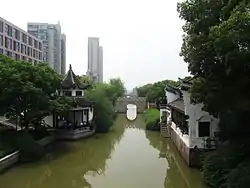Pinghu
Pinghu is a county-level city in the east of Jiaxing's administrative area, in the northeast of Zhejiang Province, bordering Shanghai to the northeast. It sits next to the East China Sea and the north shore of Hangzhou Bay. Prior to the Ming Dynasty, Pinghu was part of Haiyan County. In 1430 Pinghu County was established. In 1991 Pinghu became a county-level city under the administration of the prefecture-level city of Jiaxing.
Pinghu
平湖市 | |
|---|---|
 | |
 Pinghu Location in Zhejiang | |
| Coordinates: 30°42′N 121°01′E | |
| Country | People's Republic of China |
| Province | Zhejiang |
| Prefecture-level city | Jiaxing |
| Area | |
| • Total | 536 km2 (207 sq mi) |
| Population (2002) | |
| • Total | 480,000 |
| Time zone | UTC+8 (China Standard) |
| Postal code | 314200 |
| Area code(s) | 0573 |
| Pinghu | |||||||||
|---|---|---|---|---|---|---|---|---|---|
| Chinese | 平湖 | ||||||||
| Literal meaning | Peaceful Lake(s) Pacified Lake(s) | ||||||||
| |||||||||
History

Zhapu, the site of a deepwater harbor, was the principal site of China's foreign trade with Korea and Japan during the 18th and 19th century.
Administration
3 neighborhoods (subdistricts), 7 towns
- neighborhood committee and offices
- Zhongdai neighborhood
- Danghu neighborhood
- Caoqiao neighborhood
- towns
- Zhapu
- Xindai
- Xincang
- Huanggu
- Quantang
- Guangchen
- Lindai
Geography and climate
Pinghu is located on a low and flat plain and is laced with a network of rivers. A number of islands, such as Wangpan Shan are located offshore. The municipality's average yearly temperature is 15 °C (59 °F), with average precipitation of 1,186 mm (46.7 in).[1] Agricultural production is marked by its amount of aquatic products. Important crops are rice, wheat, Chinese cabbage, prawns, and bird eggs. Specialties include pickled eggs and watermelons.[2] Due to its proximity to Shanghai, Pinghu also attracts investment from many multinational enterprises. Industry includes clothing, packaging, machinery, paper and others. Clothing production is especially high, with the value of Pinghu's total clothing exports the greatest in China. It has been placed as one of China's one hundred most productive areas.[3]
Zhapu harbor in the municipality's southwest is an important deep water harbor along Hangzhou Bay. A port has been located here since the Tang dynasty, and it is still an important transshipment point. Next to the harbor is one of China's most important large thermal power plants, Jiaxing Powerplant, with a capacity of 3,000,000 kilowatts.
In modern China many famous monks, educators and artists (music, calligraphy, painting, seals, poetry) have come from Pinghu. The city's downtown contains a large memorial to Li Shutong and a number of other attractions and scenic spots.[4]
References
- 自然地理. Pinghu Municipal Government (in Chinese). Retrieved 29 March 2018.
- 农业. Pinghu Municipal Government (in Chinese). Retrieved 29 March 2018.
- 发展概况. Pinghu Municipal Government (in Chinese). Retrieved 29 March 2018.
- "Archived copy" 历史沿革. Pinghu Municipal Government (in Chinese). Archived from the original on 29 March 2018. Retrieved 29 March 2018.CS1 maint: archived copy as title (link)